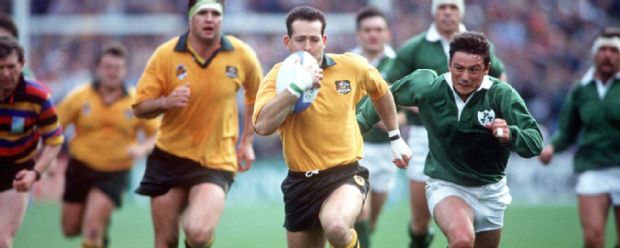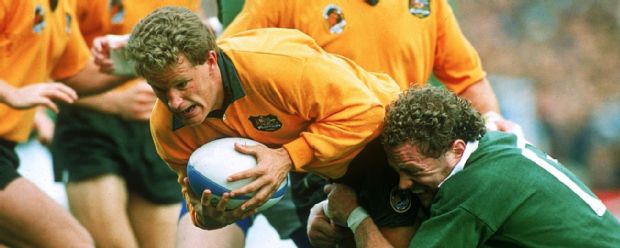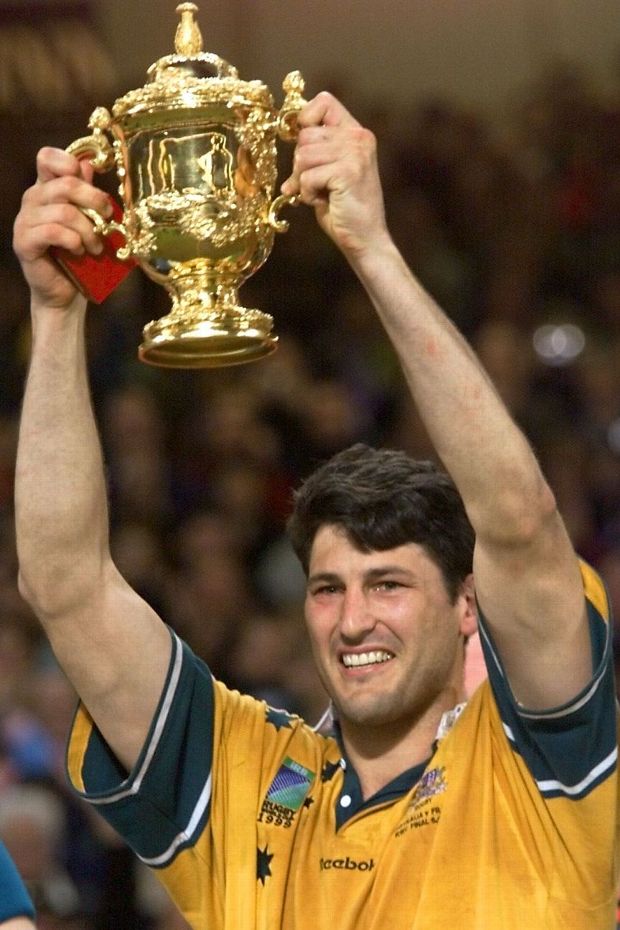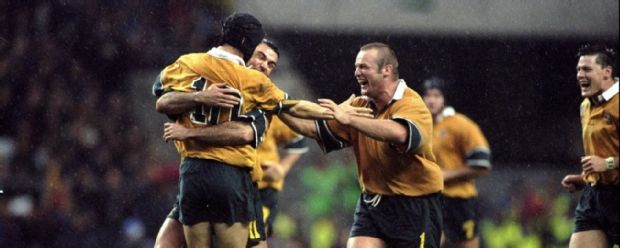|
Rugby World Cup
Greg Growden recalls Australia's World Cup triumphs in the UK
Greg Growden
September 22, 2015
When in the United Kingdom, the Wallabies know all about the importance of decorum. Such smart behaviour has worked in their favour, remaining collected, focused and restrained, enabling them to enjoy the fruits of two out of two successful but vastly different World Cup campaigns in that part of the world. But occasionally, just occasionally, for a few seconds at least, they have been Ministers for Bad Manners... including during the final moments of the 1991 World Cup final at Twickenham when the tension became too much for their coach Bob Dwyer. Dwyer has always been an expressive character. He can be flamboyant, irritable, loud. He can be pensive. He is always engaging, and always lets you know where you stand... sometimes to his own detriment. He can often be overwhelmed by the circumstances and turn into an emotional loud-mouth, as was the case when Australia were trying to keep hold of a small lead late into the second half of the final. The moment got the better of Dwyer, particularly when David Campese and Michael Lynagh opted for a backline move that appeared doomed for failure. As Lynagh drew away from Campese and was about to be swamped by the England defence, Dwyer leapt to his feet and screamed: "Kick it to the bloody shithouse!" The only problem was where Dwyer was situated at the time. He was perched in front of the Royal Box just below Queen Elizabeth. A millisecond after he had uttered these words, he suddenly realised where he was, put his hands to his head in embarrassment and sheepishly sat down. Australia did not kick it to the bloody shithouse, but they won nonetheless. After the Australian press contingent had filed their 'you beauty we've won the World Cup for the first time' match reports, word filtered out about how Dwyer had made the Queen blush. This was just too good to be true, the perfect follow-up to the World Cup victory story, something the television stations would not have, and something we could emblazon all over the Sydney Morning Herald front page on Monday. But it was one of those iffy quotes. A quote you could not run without checking with Dwyer that he actually said it. A quote that you would do anything to make sure that if Dwyer had said it, he did not stop you from using it. It was just too good a quote. How to check it? With yet another deadline hovering, time was again tight and we were stranded at Twickenham while the Australian team was on their way to London for a victory dinner at the Royal Lancaster Hotel. It was time to beg, borrow or steal a lift and luckily former British Lions backrower and then Mail on Sunday rugby writer John Taylor drove past, felt sorry for us, and gave us a ride into town. First problem, trying to get into the dinner, when we had forgotten to reply to our invitations. Easy, bluff your way in. Then to find Dwyer. That proved more difficult, particularly as the function was spread over a few floors. It appeared that the mass was downstairs in a huge hall, and after negotiating with a few more security guards, we were mingling with the players, officials and hangers-on. Dwyer was sighted far away in the distance, but our progress towards him was hampered by the arrival of a massed piped band, which for 20 minutes marched up and down the room, barging into everyone, as they blared out rendition after rendition of "Land of Hope and Glory." _r8910_864x1296_2-3.jpg&w=620) © Allsport UK/ALLSPORT Eventually the band strode out of the room, but Dwyer was gone. More aimless mingling, until he was sighted heading towards the men's toilets. He was tackled high, and around the legs. He could not go anywhere. Then a carefully constructed series of questions were thrown at him, leading up to the finale of 'wow you must have been really nervous in that second half when you go to your feet and yelled kick it to the shithouse ha ha ha, pretty nervous eh Bob? Lot of pressure on eh Bob?" He looked at us sternly. Oh no, we've ruined it. The face then changed abruptly, up rose a wide smile, a laugh and then: 'Talk about nervous. Geez I didn't even realise where I was. Fancy saying that in front of the..." He was cut off in mid sentence. "Seeya Bob. Gotta go Bob. You know what it is like Bob, deadlines always beckoning." We fled the room, before he had any chance of changing his mind and asking us not to use the quote. We were off, and away. The next day, the quote was emblazoned across the front of the SMH. This was the moment when Australian Rugby at last saw, touched, appreciated the light on the hill. But the players didn't really have any idea how big their feat was. That was only confirmed when they returned to Sydney a few days later and were involved in a ticker-tape parade down George Street. That morning, the players seriously did not think anyone would turn up for it. That they were then stunned by the reaction is an understatement. The feats of Campese, Horan and co during that tournament were crucial. But as important was the meticulous off-field preparations. For so long, Australian Rugby had been a ramshackle, strictly amateur, deeply divided pursuit. For a number of years, the Wallabies were never truly one, as NSW and Queensland political factions often threatened to bring it all down. A lot of the division was simply petty. The Australian Rugby Union made the bright move of getting the warring factions in line by ensuring that both states had major roles in the running of the team. Alongside Dwyer was Queensland coaches Bob Templeton and Jake Howard, while the often-mischievous Queensland coach John Connolly was made one of the Test selectors. It also provided the necessary back-up staff by including a physiotherapist, dietician, sports psychologist, media manager and several Australian Institute of Sport representatives, who spent the campaign watching and analysing the other teams and referees.  Australia's David Campese races away from Ireland's Rob Saunders to score a try© Bob Thomas / Getty Images This is all par for the course now, but then it was revolutionary. Presiding over it all was the Australian Rugby Union president Smokin' Joe French, who with years of hands-on experience had seen it all, especially during the terrible 60s and 70s when the Wallabies used to get beaten by anyone. As French, then in his seventies, watched the Wallabies train before the final, he said: "In those days, we never had a physiotherapist, doctor, dietician or physical education instructor when we went on tour. It would just be the manager and the coach trying to sort it all out. There was nothing scientific about the preparation. If someone was injured, we couldn't call on the doctor straight away. No matter how serious the injury, we had to ring for a taxi and get the player to the closest hospital, where we hoped he could be fixed up real quick." During the 1991 World Cup, the Wallabies were housed in the luxurious surrounds of the King Henry VIII hunting lodge in Surrey, where they were treated like royalty. It was nothing like what French had to endure when he was Wallabies team manager in 1971 where they found themselves housed in a mental asylum in Strasbourg. Twenty years on, in more relaxed surroundings, the Australians knew how to charm those around them. They immediately appeased the unpredictable British media by constantly being available for interviews. Every day of the tournament, the Australians held a press conference, where everyone was usually available. The conferences became standing room only affairs, as unlike most other teams, the players and coach were prepared to say something newsworthy, or simply be honest. In contrast other teams like England and New Zealand treated the media with contempt. And when in Ireland, that approach definitely worked in Australia's favour- to the detriment of the All Blacks in particular. The Wallabies stayed in the middle of Dublin, trained at Trinity College, and were sighted in the local pubs, reveling with the locals. One day, Wallabies captain Nick Farr-Jones was on the front-page of one of the Dublin afternoon newspapers, merrily downing a pint of Guinness. Australia quickly became Ireland's second favourite team. The All Blacks remained their usual dour self. A typical exchange involved an Irish journalist and an All Black official after a training session where patrons were forced to pay several dollars to watch the New Zealanders run around. The Irish journalist tried to create some level of bonding by saying that he had met the official at a function on a previous tour. 'So' came the reply. The Irish journalist gave up as well, departing with: "Well the pleasure was all yours, you gobshite."  © Getty Images After Australia defeated Ireland in dramatic circumstances in the quarter-final- when with just minutes to go it appeared the home team at Lansdowne Road was about to inflict the turn up of the tournament- there was a genuine fear among the visitors that the locals may turn on them. The about turn of emotion from jubilation to despair within just a few minutes was certain to inspire erratic behaviour. Instead came an outpouring of affection. The Irish players immediately embraced their Australian cousins, offering them genuine support, demanding that they win the Cup for the Irish community as much as their own. As the Irish Press said the following day: "Here's to another advance by Australia Fair against the All Blacks next week. All Ireland will be behind you." And they were- with the Irish backing so crucial in relaxing Australia in the lead-up to the All Blacks semi-final, where they produced an exceptional performance, described by Sir Nicholas Shehadie, one of the original movers and shakers behind the World Cup concept, as the most significant victory in the history of Australian Rugby. Winning the final over England was a doddle after negotiating Ireland and New Zealand in the finals. Eight years on, there were marked contrasts in the next successful Australian World Cup campaign. The first was warm, bright. The other cold, professional. Dwyer was vibrant, all embracing. He knew how to befriend anyone. He was the true salesman. Macqueen was distant, with an often-debilitating streak of paranoia. He was suspicious of so many, demanding that even the media be part of his inner sanctum, or be left on the outer. He was the chilling managing director who thrived on agendas. Agenda A was basically what was going on. Agenda B was the bland line fed to the media. He was so worried, wary about all those around him, and with it the fear of being criticised, that he even tried to appease the opposition by organising games of golf with his Tri Nations coaching foes. Some players found him too standoffish, too rigidly focused, and sometimes far too sensitive. His best asset was his organisational skills. He treated coaching as if he was the CEO of a middle-sized business. He knew how to delegate well, and recruit well. And he was wise enough to get capable people to act as his go-betweens with the players. Around him in 1999 was a sturdy team of competent assistant coaches and off-field staff. Everything was meticulously planned. Many were derived from rugby league, not surprising as the team's defensive coach was former Kangaroo John Muggleton. It revolved around a two-year plan, which culminated at Twickenham on November 6, 1999. The focus was on the team having: "No Regrets." Leaving nothing behind. Helping their campaign also was that the Wallabies were again able to enjoy the early part of the tournament in Ireland- this time based at a luxurious golf resort at Portmarnock, near Dublin. Again the location helped settle the nerves. They arrived in Dublin at 10am. By midday they were on the golf course. That night they had a team bonding session at a nearby pub. Again the priorities were well set. It's not just the experience. You also have to enjoy the experience. The locals had built a rugby ground at the end of the golf course for the Wallabies to train at- and it was the ideal of settings. They were left alone. There were hardly any prying eyes, enabling them to work on moves, strategies.  © WILLIAM WEST/AFP/Getty Images There were plenty of Irish in the crowd. But they weren't spies. They were more friends, happy to pal around with the Wallabies who responded as if they were at an out of the way rural ground- which they almost were. Unlike many teams where the forwards and back train separately, Macqueen made certain that the Wallabies operated as a single unit most of the time. This undoubtedly helped communication, understanding and team unity. Like the 1991 team, the 1999 variation was impressive, having depth in numerous positions, and match winners in important areas of the field, such as John Eales up front and Horan in midfield. They cruised through the pool matches, and were only really threatened during one of the most extraordinary World Cup matches ever played when they encountered South Africa in the semi-final. On the way to the ground, former Springboks captain and now backup Wallaby backrower Tiaan Strauss read out a message from Australian cricket captain Steve Waugh: "There's only one thing better than beating the Springboks in a semi-final. That's tying with them and going through." All of the Wallabies vividly remembered how the Australian cricket team had advanced to and then won the World Cup that year after tying with South Africa in a semi-final. But as surely as it couldn't happen again, it did. Tied 18-18 at full-time and tied 21-21 halfway through extra time, the Wallabies finally won and went through to the final. No tries were scored but it was a compelling spectacle that revolved around two special characters- Stephen Larkham and Horan. Horan played the game of his life, when instead he should have been in bed due to a serious virus, while Larkham, often a muddled dreamer, stunned the crowd with an amazing bolt from the blue. He knew little about kicking field goals and could not recall if he had ever kicked one before at senior level. Yet there he was, about 45 metres out, 93 minutes of the game gone, the scores level 21-21, his right leg throbbing due to a cork injury about to do something extraordinary. In front of him was a sea of South African defenders. He was going to be swamped. But the words from Wallabies assistant coach Tim Lane as Larkham ran out of the dressing room for extra time came back to him: "Mate, if you get in the opposition half, don't wait for (Jannie) de Beer to take a field goal- take one yourself."  © Dave Rogers /Allsport Larkham only had a second. He took quick aim, the ball wobbled off his boot and floated away, helped along by a powerful if fickle wind. It somehow went over, and they were into the final. The gods were definitely with him, because the day after they watched France play New Zealand in the other semi-final. The assumption was that they would play the All Blacks in the final. All their plans had been focused around countering New Zealand. However the All Blacks suffered one of their most unexpected of losses, and all Australia had to do in the final is counter France's nasty off-the-ball tactics, stay focused, and another World Cup triumph was theirs. Before the match, former Wallaby prop Chris Handy addressed the team. Under his arm was a bottle of 1991 Grange Hermitage. He handed it over to captain Eales with the words: "1991 was a good year, and we know 1999 will be the same. On behalf of all Australian supporters, please don't leave any gas in the tank." There was hardly a dry eye in the house. During the final, there were some testing moments, with Eales at one stage threatening a team walk off if the French persisted with their usual tactic of biting, head butting, eye gouging and even grabbing opposition testicles. The All Blacks had accused them of that in the semi-final, and there were similar moments in the final. Some of the Wallabies eyes may have been watering by the end of the game, but they had succeeded, winning a dour final 35-21. In the dressing room that night, the 1991 Grange was treated with special reverence. It wasn't tipped into the Webb Ellis Cup, but was carefully poured into special glasses and shared by the players. Sixteen barren years later, the World Cup is back in the United Kingdom, and the Wallabies are hoping, someone, anyone takes with them a bottle of 1999 Grange...just in case. © Greg Growden
|
Live Sports
Communication error please reload the page.
-
Football
-
Cricket
-
Rugby
-
- Days
- Hrs
- Mins
- Secs
F1 - Abu Dhabi GP
Abu Dhabi Grand Prix December 11-131. Max Verstappen ()
2. Valtteri Bottas (Mercedes)
3. Lewis Hamilton (Mercedes)
4. Alexander Albon ()
5. Lando Norris ()
6. Carlos Sainz Jr ()
-
ESPNOtherLive >>
Golf - Houston Open
Snooker - China Open
Tennis - Miami Open

